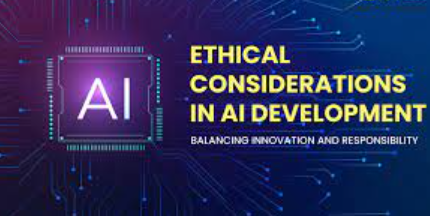Artificial Intelligence (AI) has emerged as a transformative technology with the potential to revolutionize various aspects of our lives. From healthcare to finance, education to transportation, AI applications are becoming increasingly prevalent. However, with this rapid advancement comes a host of ethical considerations that must be carefully addressed. In this article, we delve into the ethical dimensions of AI development, exploring key concerns and potential solutions.

The Importance of Ethical AI
Ethical considerations in AI development are paramount for several reasons. Firstly, AI systems have the power to influence critical decisions that impact individuals and society at large. Whether it’s determining loan approvals, medical diagnoses, or criminal sentencing, the decisions made by AI algorithms can have far-reaching consequences. Therefore, ensuring that these systems operate ethically is essential to prevent harm and promote fairness.
Secondly, ethical AI development fosters trust and accountability. Users are more likely to embrace AI technologies if they believe they are designed and deployed in a responsible manner. Moreover, holding developers and organizations accountable for the ethical implications of their AI systems encourages transparency and responsible innovation.
Key Ethical Concerns
Bias and Fairness:
One of the most pressing ethical concerns in AI development is bias. AI algorithms are trained on large datasets, which can inadvertently reflect and perpetuate biases present in society. For example, biased training data may lead to discriminatory outcomes in hiring practices or lending decisions. Addressing bias in AI requires careful attention to dataset selection, algorithm design, and ongoing monitoring to mitigate unfair outcomes.

Privacy and Data Protection:
AI systems often rely on vast amounts of data to function effectively. However, this reliance raises significant concerns about privacy and data protection. Personal information collected by AI systems must be handled with care to prevent unauthorized access or misuse. Moreover, users should have control over their data and be informed about how it is being used by AI algorithms.
Transparency and Explainability:
The inner workings of many AI algorithms can be complex and opaque, making it difficult for users to understand how decisions are made. This lack of transparency undermines trust and raises concerns about accountability. Ethical AI development emphasizes the importance of building explainable AI systems that provide insights into the decision-making process, enabling users to understand and scrutinize outcomes.
Safety and Reliability:
AI systems have the potential to cause harm if they malfunction or make incorrect decisions. From self-driving cars to medical diagnosis tools, ensuring the safety and reliability of AI technologies is crucial. Ethical AI development involves rigorous testing, validation, and risk assessment to minimize the likelihood of adverse outcomes.
Social Impact:
The deployment of AI technologies can have profound social implications, affecting employment, inequality, and human relationships. Ethical considerations extend beyond technical aspects to encompass broader societal impacts. Developers must consider the potential consequences of their AI systems and strive to minimize negative effects while maximizing benefits for society as a whole.
Ethical Frameworks and Guidelines
Addressing ethical concerns in AI development requires the adoption of robust frameworks and guidelines. Organizations such as the Institute of Electrical and Electronics Engineers (IEEE) and the European Commission have published ethical guidelines for AI development, emphasizing principles such as fairness, transparency, accountability, and privacy.
Additionally, interdisciplinary collaboration involving ethicists, technologists, policymakers, and other stakeholders is essential for navigating complex ethical dilemmas. By engaging in open dialogue and collaborative problem-solving, we can collectively work towards the responsible and ethical advancement of AI technologies.
Conclusion
Ethical considerations are integral to the development and deployment of AI technologies. By addressing concerns such as bias, privacy, transparency, safety, and social impact, we can ensure that AI systems are designed and utilized in a manner that promotes fairness, accountability, and societal well-being. By embracing ethical principles and adopting robust frameworks, we can harness the transformative potential of AI while mitigating risks and safeguarding against harm. Ultimately, ethical AI development is not just a technical imperative but a moral imperative that requires collective action and commitment from all stakeholders.
FAQs
1. What is the significance of ethical considerations in AI development?
Ethical considerations in AI development are crucial for ensuring fairness, accountability, and preventing harm in decision-making processes.
2. How can bias be addressed in AI algorithms?
Bias in AI algorithms can be mitigated through careful dataset selection, algorithm design, and ongoing monitoring for fairness.
3. Why is transparency important in AI systems?
Transparency in AI systems fosters trust and accountability by providing insight into decision-making processes and outcomes.
4. What role do ethical frameworks play in AI development?
Ethical frameworks provide guidelines for developers to navigate complex ethical dilemmas and ensure responsible innovation in AI technologies.
